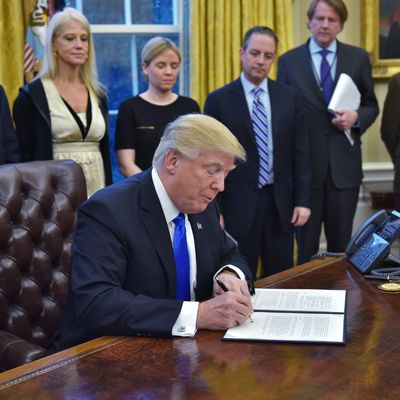
President Donald Trump signed another three new executive actions on Saturday. He ordered the reorganization of the National Security Council and Homeland Security Council, ordered a five-year ban on lobbying and a lifetime ban on lobbying for other countries for his administration’s appointees after they leave the government, and instructed the Department of Defense to come with a plan to defeat ISIS within 30 days.
Of course, as with virtually every executive order that the pen-happy, plan-lite new president has sought over his first week-plus in office, the details as to how these actions will actually play out isn’t totally clear. For instance, there is no explanation how the Trump administration will enforce the lifetime ban on lobbying for other countries after it is no longer in the White House, if they can even correctly determine who is or isn’t lobbying in the first place, since there are now plenty of ways to lobby the government without registering as an official lobbyist.
Regarding the security-council reorganizations,“People have talked about doing this for a long time,” Trump assured reporters at the signing ceremony. “Like, many years.” That apparently long-sought plan is to restructure the councils so they are “more adaptive” to modern threats like those posed by hackers and terrorists. It’s not clear how the restructuring will accomplish that goal, and analysis of the late-released text of the executive order was still underway as of mid-Saturday evening. One apparent change, however, is that the director of National Intelligence and chair of the Joint Chiefs of Staff will no longer have automatic seats on the NSC’s Principal’s Committee, while Steve Bannon — Trump’s Alt-Right consigliere — will:
Meanwhile, Politico passes along a confident comment from an unnamed Trump official regarding the anti-ISIS battle strategy explaining that the plan “would represent a profound statement on the part of the United States that we are committed to ending this atrocity. The intended results are saving an unknowably large amount of people on a humanitarian level.” Looking at the text, Trump wants a “comprehensive strategy,” new rules of engagement, and some new partners identified to join the U.S. anti-ISIS coalition, which may or may not include Russia, as often mentioned by Trump and his national-security advisor, Michael Flynn. It’s not yet clear if U.S. military planners have anything in mind that would mark an actual departure from the current U.S. strategy.
“I think it’s going to be very successful,” Trump nonetheless remarked of the unknown plan. He did not acknowledge, however, how the executive order seemed to prove, once and for all, that Trump does not, in fact, have his own secret plan for defeating ISIS as he had often promised on the campaign trail.






























